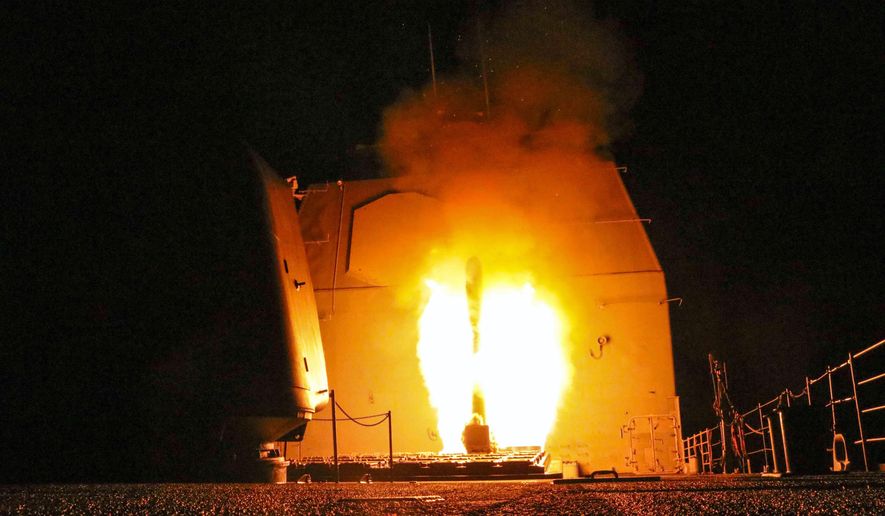Coordinated American, French and British airstrikes against targets in Syria overnight will set the country’s chemical weapons capability back “for years,” according to the Pentagon.
Defense Department Chief Spokesperson Dana White also warned that a “Russian disinformation campaign” was now underway to distort Friday’s strikes and that the Pentagon had seen a “a 2,000 percent increase in Russian trolls in the past 24 hours.”
Friday night’s sorties were launched to punish Syrian President Bashar Assad for the suspected use of chemical weapons on his own people earlier this month in Douma, a rebel-held suburb of Damascus, and to deter him from further use of chemical weapons.
Lt. Gen. Kenneth McKenzie, the director of the Joint Staff, said the strikes “hit the heart” of Syria’s chemical weapons program and that the Syrian Forces lost critical equipment but he was unaware of any civilian casualties
Syria and its main ally Russia have repeatedly denied that chemical weapons were used in Douma and that the incident was manufactured by the West.
Syrian forces fought back, Gen. McKenzie said, but added that “none of our aircraft or missiles in this operation were successfully engaged” by Mr. Assad’s regime.
Russian President Vladimir Putin called the attack an “act of aggression” that will only worsen the humanitarian crisis in Syria.
Gen. McKenzie said 105 weapons were launched against three targets and that there was no indication that Russian air defense systems were employed to thwart the attack.
The Russian military had previously said Syria’s Soviet-made air defense systems downed 71 of the cruise missiles launched by the U.S. and its allies.
“We do not seek conflict in Syria,” said Ms. White. “The strikes were justified, legitimate and a proportionate response to the Syrian regime’s continued use of chemical weapons on its own people.”
Ms. White added that the U.S. was “very confident” about the evidence that it saw that chemical weapons had been used in Douma.
Friday night’s attack was more significant than U.S. strikes against a Syrian air base a little over a year ago in retaliation for a suspected Syrian government chemical attack on the town of Khan Sheikhoun that killed more than 80 people. That operation saw the U.S. fire 59 missiles.
According to the Pentagon, targets struck included the Barzah chemical weapons research and development center near Damascus and the Him Shinshar chemical weapons storage facility near Homs. The Damascus target was hit by 76 missiles, 57 of them Tomahawks. The Homs target was hit by 22 “weapons” from the U.S., U.K. and France.
Ms. White said the attack does not represent any change in U.S. policy or an attempt to change the Syrian regime — but the U.S. goal in Syria remains to defeat ISIS.
Further developments at the United Nations
Later Saturday the U.N. Security Council plans to meet at Russia’s request, a senior U.N. diplomat told the Associated Press. The Security Council held emergency meetings this past week on the suspected poison gas attack.
Meanwhile, a global chemical-warfare watchdog group, The Organization for the Prohibition of Chemical Weapons, insists that its fact-finding mission to Syria will go ahead even after Friday’s strikes.
The group said the mission “will continue its deployment to the Syrian Arab Republic to establish facts around the allegations of chemical weapons use in Douma.”
At landmark squares in Damascus on Saturday, hundreds of Syrians gathered honking their car horns, flashing victory signs and waving Syrian flags in scenes of defiance following the airstrikes.
• This story is based in part on Associated Press dispatches.
• Dan Boylan can be reached at dboylan@washingtontimes.com.




Please read our comment policy before commenting.